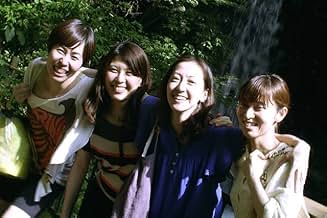IMDb RATING
7.6/10
3.2K
YOUR RATING
A slow-burning epic chronicling the emotional journey of four thirty something women in the misty seaside city of Kobe.A slow-burning epic chronicling the emotional journey of four thirty something women in the misty seaside city of Kobe.A slow-burning epic chronicling the emotional journey of four thirty something women in the misty seaside city of Kobe.
- Director
- Writers
- Stars
- Awards
- 6 wins & 5 nominations total
- Director
- Writers
- All cast & crew
- Production, box office & more at IMDbPro
Featured reviews
There are various films whose run-times are much longer than what is considered normal. Lawrence Of Arabia clocked in at 397 minutes. The Lord Of The Rings: The Return Of The King was over 200 minutes long. More recently Blade Runner 2049 clocked in at a 'mere' 164 minutes. Japanese cinema has had its share of longer movies too. The epic Seven Samurai was 207 minutes long, while Love Exposure stopped looking up just shy of the four-hour mark. Happy Hour, ironically given the title, clocks in at five hours and seventeen minutes. Even more irony is supplied courtesy of the 'happy' aspect of things. More on that later.
What the five hours length offers the viewer is a film that has the space, at what seems like the natural tempo of life, to dwell on the details, subtleties, nuances; delve into the minutiae and the corners of lives of the four female characters. They comprise the portrayals director Hamaguchi Ryûsuke intends his film, and its novice actresses, to deliver. The film is set in Kobe, Japan and makes all women look seamlessly bad. The director sets out to show not one woman as honourable or decent. When the four women run into other females the latter too end up accusatory, suspicious, corrupt and rotten. That over five hours was needed is in part because so much realism is portrayed and in part because the film aims to not be a mere movie, but to act like an unglamorous eye on the perfidy of the modern woman abusing her freedom with abandon. The realism is accentuated because the actresses are all from the director's acting workshops - none of them have any other acting credit to her name - which means their relative amateurism and occasional awkwardness makes their corruption come across as even more genuine. Even on the unintentionally rare occasion that the camera is out of focus and blurry or a fly spontaneously lands and re-lands on a character's head it ends up giving the movie even more authenticity as it helps the proceedings appear true-to-life. The same, one imagines, is true with the film going on for so long that the actors forget they are on film, forget the camera and just relax and become themselves.
A segment of contemporary Japanese films (Kamome Shokodu, Megane, Petaru Dansu, Tokyo Sora as examples) has garnered accusations of catering to the desexualisation of Japanese women who are accorded a distant and sometimes demented quality. In films like these men are incidental and, when present at all, merely there as inane plot device creatures who help the women and immediately revert to disposability. These women's newfound independence has not enhanced them with love, understanding, happiness or contentment, but unleashed a beast that is morally rudderless, yet unwilling to assume ownership. In these films, the woman is deliberately indifferent to everything except her declared impossible standards. Happy Hour takes the concept to the next level. Men are not incidental. Men are victimized and suffering at the hands of not indifferent, but outright cruel and unhinged malicious female characters who not only not see it that way, they actually believe the opposite is true. Of the four females, one is married, one is divorcing, one is already divorced and the other in flux. Each is in turn abusive towards her man to the extent that in the second half of the film the viewer is treated to evidence of despicable and duplicitous deeds by women whose selfishness is projected through extraordinary demands, insults, psychological demasculinization and actions. Not only the women behave as such, but worse they imagine themselves as the victims. Ironically, they are more accommodating to men who are not physically or psychologically protective of them. One's family, vows, norms - even female friends - and propriety be damned. These women are uniformly hostile and self-absorbed jerks to such an extent that in comparison a fifth woman who characterizes her father's protectiveness towards her as a child as the work of a serial liar and a sixth woman who expresses her love and lust to a married man - right after a dinner with the said man's wife - are the more decent ones. There has been some thought given recently that in contrast to conventional wisdom Japan is a matriarchy. This is not the place for that debate, but in Happy Hour the demanding four use accusatory language to reveal surreal selfishness. It is unfathomable how they do not communicate their outlandish wants, yet demand understanding. They receive love, loyalty, patience and material goods, yet none of it helps tether them to husband or child, feeling or logic. It is a straight road to wanton matrimonial and societal hell.
Irony has come up a few times in this text. In addition, it is ironic that there is little 'happy' (the title stems from a lengthy and revealing café scene after a workshop where the characters are encouraged to find their centres and communicate, the latter of which the viewer must by this point in this text know is useless) in this film other than the brief times the four women find themselves away from home, responsibility or committed male companionship. What the viewer gets in lieu, however, is something original, something curious, something novel, but never uplifting or inspiring.
During one seemingly throw-away shot we are treated to a view of the city from the above inclusive of its streets, alleys, houses and yards. We come away wondering at the misery that lies within especially now that we know all the normal tools of human affection, logic or persuasion have lost their efficacy.
What the five hours length offers the viewer is a film that has the space, at what seems like the natural tempo of life, to dwell on the details, subtleties, nuances; delve into the minutiae and the corners of lives of the four female characters. They comprise the portrayals director Hamaguchi Ryûsuke intends his film, and its novice actresses, to deliver. The film is set in Kobe, Japan and makes all women look seamlessly bad. The director sets out to show not one woman as honourable or decent. When the four women run into other females the latter too end up accusatory, suspicious, corrupt and rotten. That over five hours was needed is in part because so much realism is portrayed and in part because the film aims to not be a mere movie, but to act like an unglamorous eye on the perfidy of the modern woman abusing her freedom with abandon. The realism is accentuated because the actresses are all from the director's acting workshops - none of them have any other acting credit to her name - which means their relative amateurism and occasional awkwardness makes their corruption come across as even more genuine. Even on the unintentionally rare occasion that the camera is out of focus and blurry or a fly spontaneously lands and re-lands on a character's head it ends up giving the movie even more authenticity as it helps the proceedings appear true-to-life. The same, one imagines, is true with the film going on for so long that the actors forget they are on film, forget the camera and just relax and become themselves.
A segment of contemporary Japanese films (Kamome Shokodu, Megane, Petaru Dansu, Tokyo Sora as examples) has garnered accusations of catering to the desexualisation of Japanese women who are accorded a distant and sometimes demented quality. In films like these men are incidental and, when present at all, merely there as inane plot device creatures who help the women and immediately revert to disposability. These women's newfound independence has not enhanced them with love, understanding, happiness or contentment, but unleashed a beast that is morally rudderless, yet unwilling to assume ownership. In these films, the woman is deliberately indifferent to everything except her declared impossible standards. Happy Hour takes the concept to the next level. Men are not incidental. Men are victimized and suffering at the hands of not indifferent, but outright cruel and unhinged malicious female characters who not only not see it that way, they actually believe the opposite is true. Of the four females, one is married, one is divorcing, one is already divorced and the other in flux. Each is in turn abusive towards her man to the extent that in the second half of the film the viewer is treated to evidence of despicable and duplicitous deeds by women whose selfishness is projected through extraordinary demands, insults, psychological demasculinization and actions. Not only the women behave as such, but worse they imagine themselves as the victims. Ironically, they are more accommodating to men who are not physically or psychologically protective of them. One's family, vows, norms - even female friends - and propriety be damned. These women are uniformly hostile and self-absorbed jerks to such an extent that in comparison a fifth woman who characterizes her father's protectiveness towards her as a child as the work of a serial liar and a sixth woman who expresses her love and lust to a married man - right after a dinner with the said man's wife - are the more decent ones. There has been some thought given recently that in contrast to conventional wisdom Japan is a matriarchy. This is not the place for that debate, but in Happy Hour the demanding four use accusatory language to reveal surreal selfishness. It is unfathomable how they do not communicate their outlandish wants, yet demand understanding. They receive love, loyalty, patience and material goods, yet none of it helps tether them to husband or child, feeling or logic. It is a straight road to wanton matrimonial and societal hell.
Irony has come up a few times in this text. In addition, it is ironic that there is little 'happy' (the title stems from a lengthy and revealing café scene after a workshop where the characters are encouraged to find their centres and communicate, the latter of which the viewer must by this point in this text know is useless) in this film other than the brief times the four women find themselves away from home, responsibility or committed male companionship. What the viewer gets in lieu, however, is something original, something curious, something novel, but never uplifting or inspiring.
During one seemingly throw-away shot we are treated to a view of the city from the above inclusive of its streets, alleys, houses and yards. We come away wondering at the misery that lies within especially now that we know all the normal tools of human affection, logic or persuasion have lost their efficacy.
Worth it. It's long but you don't have to watch it all at once. It's a unique movie that foregrounds the slow details and nuances of the moments we experience. I think it expresses subtle, wordless feelings of magic and also anguish in searching for oneself and for fulfillment in our long (but short) lives.
I didn't always agree with the women in the movie but I related to how they were questioning the surface of themselves and their lives, searching for something more than what they'd fallen into or were told to be. The movie is humorous at times, depressing at times, and both. It left me with a feeling of silent reflection on the many sides to life and to people.
I didn't always agree with the women in the movie but I related to how they were questioning the surface of themselves and their lives, searching for something more than what they'd fallen into or were told to be. The movie is humorous at times, depressing at times, and both. It left me with a feeling of silent reflection on the many sides to life and to people.
We get to know these characters so intimately, we feel they are our friends and at the same time strangers we discover more and more. The 5 hours 17 mins are perfect and every minute worthwhile. I would even love to continue another 5 more hours and continue to see these interesting lives unfold.
It is my first Ryûsuke Hamaguchi film and surely not the last. His incorporation of art and amazing stories into the narrative with vignettes of every day contemplation mixed with big events and poignant scenes are masterful. A few standout scenes are:
A life-affirming course by an artist A writer reading a short story and sublime Q&A A stranger in the bus talking about her father An estranged wife unwelcoming her husband into her temporary home A couple dealing with their son's transgression A nurse scolding a younger nurse about life and death A woman talking to the sister of the man she likes about sex and love
At the center, there are often friends around a table with sublime dialog and lowkey acting. The nonverbal interactions are extremely effective at conveying intrigue, tension and sympathy. We understand the complicated lives of these four women and the people around them in great detail with non-judgmental equanimity. The story is poetic like Edward Yang's "Yi Yi", but not as funny. It also reminds me of Chang-dong Lee's "Poetry". It is however very much its own film and with its on pace and universe.
At times, it shows a somewhat bleak reality of failing relationships and discovery but with so much insight and artistic enhancement. A masterpiece in all aspects that never feels forced, by always allowing introspection and growth, and showing the complexity of life and people. It invites us to observe, it expands our boundaries slowly, it questions and reflects. The moving parts are so well woven together, and the attentive viewer never misses a beat or gets bored. We are there with the characters and events, at the table with them, in their homes or in vacation, at the tumultuous crucial reading and its aftermaths.
A movie that redefines movie-making in its impeccable vision and visceral journey.
It is my first Ryûsuke Hamaguchi film and surely not the last. His incorporation of art and amazing stories into the narrative with vignettes of every day contemplation mixed with big events and poignant scenes are masterful. A few standout scenes are:
A life-affirming course by an artist A writer reading a short story and sublime Q&A A stranger in the bus talking about her father An estranged wife unwelcoming her husband into her temporary home A couple dealing with their son's transgression A nurse scolding a younger nurse about life and death A woman talking to the sister of the man she likes about sex and love
At the center, there are often friends around a table with sublime dialog and lowkey acting. The nonverbal interactions are extremely effective at conveying intrigue, tension and sympathy. We understand the complicated lives of these four women and the people around them in great detail with non-judgmental equanimity. The story is poetic like Edward Yang's "Yi Yi", but not as funny. It also reminds me of Chang-dong Lee's "Poetry". It is however very much its own film and with its on pace and universe.
At times, it shows a somewhat bleak reality of failing relationships and discovery but with so much insight and artistic enhancement. A masterpiece in all aspects that never feels forced, by always allowing introspection and growth, and showing the complexity of life and people. It invites us to observe, it expands our boundaries slowly, it questions and reflects. The moving parts are so well woven together, and the attentive viewer never misses a beat or gets bored. We are there with the characters and events, at the table with them, in their homes or in vacation, at the tumultuous crucial reading and its aftermaths.
A movie that redefines movie-making in its impeccable vision and visceral journey.
I'll admit my attention often drifted in the first quarter (lingering shots) but by the last hour I was thoroughly engaged - I even wanted to spend a little longer in everyone's company. Like walking back home from your friend's house after a great night, and the subsequent emptiness. I saw fragments of myself in Jun's husband and it terrified me. Kobe looks beautiful!
10linistea
Giving a feeling of Bergman meets Romer, this movie is very intimate, and quietly leaves deep traces for long after seeing it. About the ambiguity of love, power of friendship, transformation and intimacy, an emotional journey.
Did you know
- TriviaIn France, the film was released theatrically in three parts over three weeks, respectively dubbed "1&2", "3&4" and "5". The film was thus advertised as "The First Cinema TV Series".
- How long is Happy Hour?Powered by Alexa
Details
- Release date
- Country of origin
- Language
- Also known as
- Happy Hour
- Filming locations
- Kobe, Hyogo, Japan(main setting)
- Production companies
- See more company credits at IMDbPro
Box office
- Gross worldwide
- $337,256
- Runtime5 hours 17 minutes
- Color
- Aspect ratio
- 1.85 : 1
Contribute to this page
Suggest an edit or add missing content




















